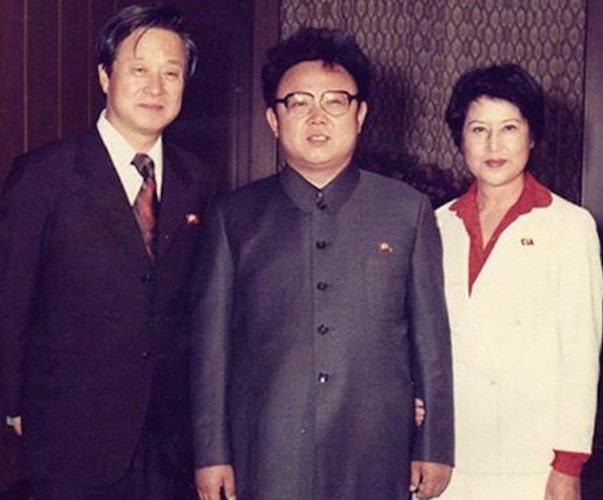Film Review: Was “The Lovers & the Despot” Really Necessary?
It is a fantastic tale: Kim Jong-il, then heir to the leadership of North Korea, kidnapped South Korean superstars to beef up the country’s impoverished cinema.
The Lovers & the Despot, directed by Ross Adam and Robert Cannan. Screening at the Kendall Square Cinema, Cambridge, MA

(l to r) South Korean filmmaker Shin Sang-ok, dictator Kim Jong-il, and actress Choi Eun-hee in 1950s Korea.
By Gerald Peary
I remember being at the Berlin Film Festival market around 1980 and stopping from curiosity at a rather threadbare booth representing the North Korean film industry. One guy sitting on a folding chair. A couple of pamphlets on a card table. I picked up the most promising pamphlet, which showed off with illustrations the newest films produced in North Korea, also available for international rental or purchase. I am certain I laughed aloud. The pickings, seemingly aimed at adults, were limited-animation cartoons on about a third-grade level which featured cherubic barnyard animals acting out some simplistic didactic message. Aesop’s Fables for an enslaved population. Surely there was more than this pathetic kitsch?
We can understand why, in the documentary, The Lovers & the Despot, Kim Jong-il, heir then to the leadership of North Korea, decided that the native moviemaking needed to go upscale. Kim allegedly ordered the 1978 kidnapping of South Korea’s best-regarded filmmaker, Shin Sang-ok, and Shin’s leading lady, Choi Eun-hee, and brought them across the border to Pyongyang. His plan was to have these South Korean superstars beef up the impoverished North Korean cinema. Kim was an avid movie fan. I’ve read that he had a personal collection of 15,000 films, and he even authored a book, On the Art of Cinema (1973). Although nothing was allowed to be made in his own country besides naïve cartoons and Maoist-style ideological epics, Kim admitted to Shin (there’s a tape recording) that he was turned off by the dripping tears so prevalent in the movies of his country. He was tired of having every North Korean film be like every other. (All of them propagandized a life of hard work, fervid patriotism, and keen loyalty to the one-man regime: Kim’s god-on-earth dad, Kim Jong II.)
Shin went to work, swearing complete allegiance to Kim, his benefactor and captor. Sleeping just three hours a night, he and Choi made 17 features in two years in North Korea. The movies of Shin (they are in a South Korean archives, mostly unavailable to the public) are regarded as far more open in style and subject matter, far less political, than the servile, conformist output of in-house North Korean directors. One film, Pulgasari (1985), was a monster mash, a Japanese-style Godzilla rip-off, and even got limited distribution in the West. (It can be seen on YouTube.) And there was a lavish period costumer starring Choi which featured a love story. It was a first ever for a North Korean film.
The more pleased Kim became with his slave actress and director, the more freedom he granted them, finally allowing them to appear live with their movies at foreign festivals. One could guess the outcome: Chin and Choi dashed from their hotel in Vienna in 1986, asking for asylum at the American Embassy. Asylum was granted, and they arrived in the US, giving a press conference. They claimed that all they’d said publicly in praise of Kim was a lie, they blasted the totalitarianism of North Korea. Free at last!
Or were they? Many were skeptical of their tales of being kidnapped, and decided they’d arranged the whole thing, as their own careers were on the skids in South Korea when it happened. Their pledge of loyalty to Kim was real, not faked. Who really knows? Certainly not the filmmakers.
It’s a fantastic narrative. Too bad it’s told so badly in The Lovers & the Despot. The interviews by co-directors Robert Cannon and Ross Adam are so superficial, barely probing. They are amateur journalists. It’s obvious too that they are not real cineastes, so we learn little substantive about either South or North Korean cinema, and, frustratingly, nothing about what kinds of films Kim watched and admired. The words of the interviewees are supplemented by awkward recreations and, even more ill-advised, melodramatic scenes from Chin’s movies to dramatize real things that happened to Chin and Choi. One must ask: was there a real need for this mediocre documentary to be made? The narrative might be better served by a lengthy magazine article.
Gerald Peary is a retired film studies professor at Suffolk University, Boston, curator of the Boston University Cinematheque, and the general editor of the “Conversations with Filmmakers” series from the University Press of Mississippi. A critic for the late Boston Phoenix, he is the author of nine books on cinema, writer-director of the documentaries For the Love of Movies: the Story of American Film Criticism and Archie’s Betty, and a featured actor in the 2013 independent narrative Computer Chess.
Tagged: Choi Eun-hee, Kim Jong-il, North Korea, Robert Cannan, Ross Adam, Shin Sang-ok, South Korea, documentary
